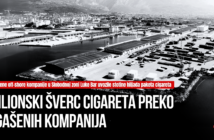Costal Zone Management removed business documentation concerning Branislav Micunovic’s rent of the Budva marina
Documentation of payments of Branislav Brano Micunovic for the rent of the Budva marina in the period from 2003 to 2012 was destroyed due to the decision of the Public Enterprise for Coastal Zone Management, reveals MANS Investigation Center and the daily Dan.
At the end of 2015, MANS Investigation Center requested an insight into all the payments under the Agreement on the use of the coastal zone in the Budva marina in 2002, which had been made towards the Public Enterprise for the Coastal Zone Management. The contract was concluded with the “Er-Ve Montemarine doo” company from Podgorica in April 2002. A year and a half later, in November 2003, an annex to the contract was concluded with the company “MC Marina” Budva, as the legal successor of the previous company.
According to official data from the Central Registry of Business Entities, the founders of “MC Marina” Budva were Predrag Micunovic, nephew of Branislav Micunovic, and the company “Anagusta doo” from Budva, the founders of which were Branislav Micunovic and Nenad Micunovic. The company “MC Marina” Budva, meanwhile, has changed its name to “Dukley Marina” and the new owner is “Stratex development” from Budva.
The Coastal Zone Management responded that it had destroyed the documentation that included the payment of Micunovic’s company to the public enterprise during the period from 2003 to 2012. In the minutes from January 2012 it is stated that “the destruction of worthless registration materials will be carried out after the decision on the approval of the destruction by the State Archives – Budva Department.”
It is further stated that those are financial and accounting documents, as well as files involving the use of coastal zone, various correspondence, requests, etc., covering the period from 1992 to the end of 2008, and they were destroyed in accordance with the Law on Archives and the Ordinance on the method of selection of archival material, thanks to which the Coastal Zone established the list of categories of registration materials with the retention period.
Data on the financial operations of the longtime owner of the Budva marina Branislav Brano Micunovic may be relevant to potential court proceedings, especially when considering that his business is subject to numerous criminal charges and investigations.
Otherwise, the Coastal Zone Management in the List of Categories of Registry Materials as an internal document, of which MANS Investigation Center came into possession, defined very short time limits for retention of the documentation. Therefore, after only five years, it can destroy financial plans, bookkeeping documents, such as book entry orders, accounts, payments, collection of receivables, promissory notes, invoices, requests for transfer of funds, contracts for short-term loans, and after only two years correspondence with banks regarding foreign exchange transactions or correspondence with suppliers and customers.
After only three years, the Coastal Zone Management can destroy all documents relating to the procedure of leasing temporary locations, and after ten years, the documentation of leasing beaches.
Therefore, the Coastal Zone Management has prescribed a very short time limits for keeping the documentation that investigative bodies could use as evidence in detecting malfeasance of office, which essentially makes it difficult to prove the crimes committed by the former and current executives.
The Criminal Code of Montenegro stipulates that the criminal offense of malfeasance of office becomes obsolete ten years from the commission of the offense, for which a person can be imprisoned for over five years. However, the Public Enterprise for Coastal Zone Management has destroyed numerous documents that could have been used as evidence in a much shorter time.
Authors:
Milica Krgovic
Ines Mrdovic
This text is created with the support of the European Union within the project “Zero Tolerance to Corruption”. Network for Affirmation of Non-Governmental Sector – MANS is solely responsible for the contents of this article, and the views taken herein shall not in any case be considered as those of the European Union.
Destroying petitions on crime
The Ministry of Interior (MoI) can destroy all the petitions which indicate the commission of criminal offenses of public and economic crime, those related to organized crime and corruption and the fight against drugs and smuggling, after only five years, while related correspondence may be destroyed after only two years, although the investigation in many cases last longer than a decade. Removing those documents is enabled by a bylaw that was signed by the former Minister Rasko Konjevic in February last year.
After two years, the MoI can destroy all the requests for issuance of ID cards, for their replacement or requests for declaring them invalid. The same goes for requests for application, change, determination of residence and change of address, and decision on the cancellation and refusal of residence. The same deadline is prescribed for the requests for use of the mobile station for the issuance of identity cards and passports, which are used for issuance of personal documents to elderly and sick persons, as well as to persons with disabilities.
Data on verification of citizenship status, as well as correspondence concerning nationality, telegrams, checking discharge from Montenegrin citizenship or audit have to be kept only for a year, although Montenegro is well known for issuing citizenship under special conditions to suspicious businessmen and persons convicted of corruption.
Agreements on business and technical cooperation, which in practice are one of the most common mechanism for drawing money from the fictitious institutions, are only kept for five years. It is known that officials of the Ministry of Interior and the Police Administration have been subject of investigations in many cases, related to various suspicious agreements, especially in the cases of “Limenka” and the Zlatica Camp. Moreover, the issue of the destruction of the documents is particularly relevant for the recently launched question on the tender for new ID cards, which turned out not be biometric.




